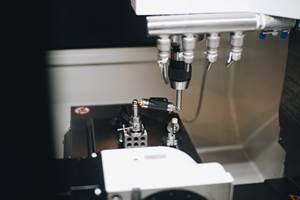Buying a Coordinate Measuring Machine: CMMs Past and Future
While there has been much speculation that CMMs are becoming obsolete, the opposite is true.
Share





Coordinate measuring machines (CMMs) have been around since the 1960s. In most precision manufacturing facilities, the CMM is the company’s chief dimensional measurement device that is traceable to the standards maintained by National Institute of Standards & Technology (NIST). Most CMMs are used to verify dimensional accuracy for quality control (QC) and first-article inspection, the function of checking the first part produced by a manufacturing process to verify that it is meeting tolerance requirements. Inspection with a CMM provides data for in-process measurements to ensure dimensional integrity from operation to operation and to satisfy traceability requirements. CMMs are also used to perform gage repeatability and reproducibility (R&R) studies, 2D and 3D scanning, part sorting, reverse engineering and a host of other tasks.
By some estimates, the global installed base of CMMs is about 150,000 units. Because of the typical air-bearing design of many CMMs, the structure of these devices seldom wears out. Therefore, the lifespan of a CMM may exceed 30 years. Many 30-year-old CMMs are used daily throughout the precision manufacturing world. Older CMMs can be easily upgraded with new electronics, drives and the latest software, adding an extra 10 years to a machine’s usable life. In fact, a CMM can be retrofitted multiple times to extend its life even further.
During the past several decades, CMMs have become faster, more accurate and more affordable. While there has been much speculation that CMMs are becoming obsolete, the opposite is true. Today, CMMs are more versatile and functional than ever before.
Shop-Hardened CMMs
For all their advancements, CMMs have long been the source of bottlenecks and frustration on the manufacturing floor. Machine tools may sit idle for hours, even days, waiting for the inspection results from the QC lab prior to the production. It’s not hard to understand why many production managers would like to see CMMs taken out of the QC lab and put onto the manufacturing floor.
Unfortunately, CMMs utilizing the traditional air-bearing construction with granite tables do not perform well in an open shop environment. Unlike temperature-controlled QC labs, shopfloor conditions rarely can maintain a constant 68°F temperature considered optimal for CMM performance in a lab. When the ambient temperature varies, measurement results also vary. The laws of physics underlie these variabilities. Furthermore, holes in air bearings tend to clog with oil, dust and debris floating in the air when machine tools are nearby. In these conditions, a CMM will eventually stop working properly. Today, shop-hardened CMMs have emerged to resist these problems. For these devices, air bearings have been replaced with mechanical bearings and linear guideways. Machine components manufactured from thermally stable materials have resulted in stiffer, lighter structures and thermal compensation for use outside temperature-controlled settings. Machine footprints are smaller to take up less valuable manufacturing floor space. Cantilever designs, which offer the most effective measuring volume, are making a comeback for shop-hardened applications. Interestingly, cantilever designs were once the most common type of inspection machines in the early years of CMM technology.
The Future of Production CMMs
As for the future, I envision that there will come a time when all CMMs will be fully integrated into the manufacturing process as manufacturing companies continue to demand in-line measurements for immediate feedback. This will enable timely, in-line adjustments to eliminate scrap and improve quality.
CMMs will be treated like any other machine tool as an integral part of the manufacturing process. The same operator machining the part will also load the part onto the CMM and push the button. Simplicity and ease of use will be required for this integration. Developments advancing this trend include color mapping to show where a workpiece is in or out of tolerance. Easy-to-read reports will be the norm. Because machine operators are not metrologists, the information from the CMM must be displayed in easy-to-understand reports. Systems capable of performing measurements at different stages throughout the process without human intervention are emerging, and manufacturing processes will self-correct based on these automated measurements.
This is part one of a three-part series about buying a CMM.
Find more insights about acquiring a new machine tool by visiting the Techspex Knowledge Center, “Guide to Buying Machine Tools.”
Related Content
The Many Ways of Measuring Thickness
While it may seem to be a straightforward check, there are many approaches to measuring thickness that are determined by the requirements of the part.
Read MoreBallbar Testing Benefits Low-Volume Manufacturing
Thanks to ballbar testing with a Renishaw QC20-W, the Autodesk Technology Centers now have more confidence in their machine tools.
Read MoreProcess Control — Leveraging Machine Shop Connectivity in Real Time
Renishaw Central, the company’s new end-to-end process control software, offers a new methodology for producing families of parts through actionable data.
Read MoreHow to Choose the Correct Fixed-Body Plug Gaging Solution
The two types of fixed-body plug gages are both accurate, fast and easy to use. Consider these factors when selecting one for your gaging application.
Read MoreRead Next
Setting Up the Building Blocks for a Digital Factory
Woodward Inc. spent over a year developing an API to connect machines to its digital factory. Caron Engineering’s MiConnect has cut most of this process while also granting the shop greater access to machine information.
Read MoreRegistration Now Open for the Precision Machining Technology Show (PMTS) 2025
The precision machining industry’s premier event returns to Cleveland, OH, April 1-3.
Read More5 Rules of Thumb for Buying CNC Machine Tools
Use these tips to carefully plan your machine tool purchases and to avoid regretting your decision later.
Read More





























